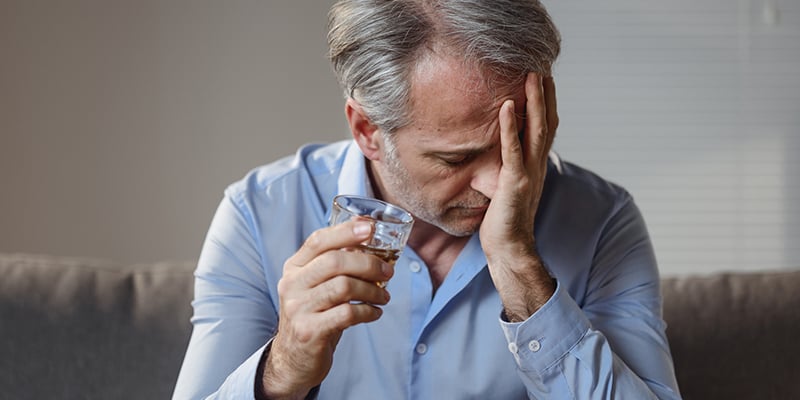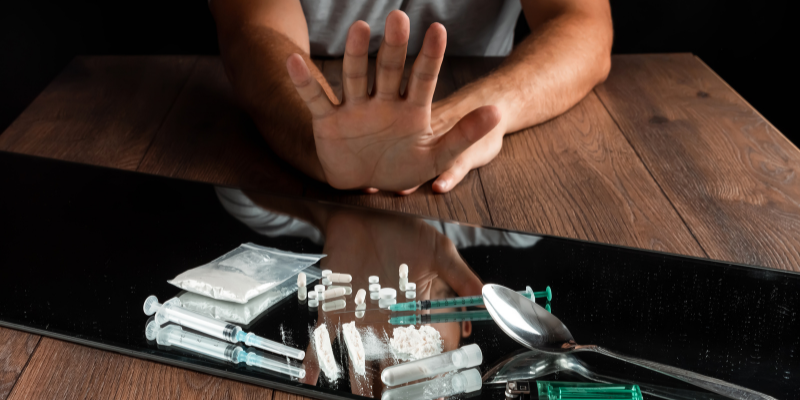
When you are chained by an addiction, you know it affects every area of your life. It’s no secret that substance abuse ruins lives, devastates families, destroys relationships, and negatively impacts careers and schoolwork. It also leads to physical health problems and is commonly connected to mental health disorders like depression and anxiety.
What you may not realize is that it ravages the brain. The brain scans of substance abusers show dramatic damage—even worse than the brain scans of severely depressed people, schizophrenics, or even serial killers.
Brain imaging technology called SPECT looks at blood flow and activity in the brain. In surface scans, SPECT shows areas of the brain with healthy activity and areas with too little activity. The underactive areas look like holes or dents. The scans of healthy brains show full, even, symmetrical activity. The brains of substance abusers look like Swiss cheese.
Arnie was 56 when he got a brain SPECT scan. Sure, he was having 3 or 4 drinks a day, but he didn’t consider himself an alcoholic because he didn’t feel drunk or out of control. His brain told another story. His daily drinking was harming his brain, reducing his mental sharpness, and impacting his work.

The good news is that the brains of substance abusers have the potential for some of the greatest improvement. The before-and-after scans often reveal a stunning level of recovery. No matter what you are addicted to—drugs or alcohol or both—your brain can recover too. You need to follow these 10 steps.
10 Steps to Breaking Free from Addictions
1. Know your motivation.
To drive your desire to change, you must know why you want to get clean and sober.
2. Get the right evaluation.
The road to recovery starts by assessing the 4 circles of your life—biological, psychological, social, and spiritual—and optimizing any areas that need improvement.
3. Know your brain type.
Not all addicts are the same. Brain imaging shows there are 6 different types of addicts:
Type 1: Compulsive addicts
Type 2: Impulsive addicts
Type 3: Impulsive-compulsive addicts
Type 4: Sad or Emotional addicts
Type 5: Anxious addicts
Type 6: Temporal lobe addicts
Knowing your type will help you find the most effective solutions for your situation.
4. Boost your brain to gain control.
Enhancing your overall brain health will make it so much easier for you to stick with a recovery program and avoid relapse. And treating any co-existing conditions, like depression or anxiety, will help you heal your brain.
5. Learn to control cravings.
Make simple changes to your daily habits to avoid triggers. If your team at work usually goes to happy hour after work, suggest doing a group hike or some other activity. Daily exercise is another way to reduce cravings.
6. Eat right to think right.
Consuming brain healthy foods can help you make better decisions. For example, keeping your blood sugar levels balanced—think eating small amounts of protein at every meal and avoiding refined carbohydrates and sugary sweets—can improve impulse control in the brain.
7. Kill the ANTs.
You don’t have to believe every stupid thought in your head. Learn to overcome the automatic negative thoughts (ANTs) that infest your brain and keep you locked in your unhealthy ways. Any time you have a bad, sad, or hopeless thought, ask yourself if it is true and then talk back to it.
8. Manage your stress.
Meditation, prayer, and deep breathing exercises can help you calm the stress that can trigger a relapse. Practicing gratitude on a daily basis can also help calm stress.
9. Practice the H-A-L-T PLUS strategy.
Never get too hungry, too angry, too lonely, or too tired. Plus, learn to deal with the people, companies, and advertisers who will try to push things on you that will sabotage your brain healthy habits and your recovery.
10. Look beyond yourself.
Stop focusing on yourself and start learning to give back to your family, friends, and community. Volunteering and serving others can give you a sense of purpose in life. It helps you feel like your life matters, which is one of the best ways to break free from the addictions that steal your life.
After Arnie saw his brain scan, he made a commitment to boost his brain health by following these steps to help him stop drinking. With regular exercise, mental exercise, a brain healthy diet, and nutritional supplements targeted to his brain type, his follow-up brain scans showed great improvement. He felt more energetic, smarter, and more articulate. And his business improved. He hadn’t realized that his drinking was holding him back at the office.
At Amen Clinics, brain SPECT imaging is performed as part of a brain-body evaluation for people dealing with addictions and other conditions. The Amen Clinics Method also assesses the biological, psychological, social, and spiritual factors of your life to identify areas that can be optimized.
If you (or a loved one) are struggling with addiction, call 888-288-9834 to talk to a specialist today or schedule a visit.





How can I help my husband
He will not get brain imaging
He believes there is nothing wrong with him
Sexual abuse and other abuse s in infancy he was told
Psychologist says he dissociates from trans he cannot remember
Started running away st 3 years old
Was into string drink and marajuana in early teen years
Was and probably still is addicted to madyerbatiin
Married 40 years
Says I’m an abuser and he cannot remember what he said and did
I know this is an impossible situation
But with 10 children and him moving out and now says he’ll never live with me again
I believe that he needs brain imaging and have been helped for over 15 years by reading Anena books
His angry and violent verbal abuses are helped with Ambrotise
If he doesn’t take it we cannot even talk
Desperate for help and financially broke
If you can help in any way
It might be a life-saver for my 10 hurting children and 8 grand children
Thanks for your time and any help
Comment by Tammy — July 10, 2019 @ 6:32 AM
To Tammy: My heart goes out to you and your family. I know from personal experience the financial hardships endured when ravaged by the disease of addiction, especially with so many children; we had 8 ourselves. Even today I am quick to take down new resources so forgive my suggestions if you’ve already got them. And I wil keep your husband and family in prayer. God bless you and stay strong Tammy! Here’s what I’ve got:
1.CareCredit (they finance just about anyone and Amen clinics)
2.GoFundMe (I’ve seen far less worthy causes that people will donate to-and yours is a noble one)
3.al-anon (for Tammy)
4. The Mighty (this is an all inclusive site- there is nust so much support on there for all kinds of people!)
Comment by Regina Burton — July 16, 2019 @ 1:03 AM
First off, thank you for all the work you do to help us understand the functions of the brain, and how to keep it healthy. I have learned alot from the website and videos.
I do have concern, however, with the continuous use of the label “addict” or “alcoholic.” The article does work to approach the topic as it should be approached, to a PERSON WITH ADDICTION. But the title’s labeling of a person “addict” or “alcoholic” or what have you can cause a person to identify as only that label, true? (This is not the first Amen Clinic article to do so.) Is it not better to address a person AS A PERSON, with an issue to manage?
While it is true that addiction (all addictions, not just alcohol and drugs) effects all aspects of a person’s life, it does not mean that addiction is ALL that a person is or can be. If a person is only an addict, how will they ever manage to move themselves to the person they intrinsically were created to be?
It saddens me when clients enter my clinic with their identity all wrapped up in the label. It has been my experience both personally and professionally that growth doesn’t happen until how one identifies oneself changes! I happen to be a person who has experienced the battle of addiction, and by the Grace of God am living a drug free life. First I had to understand that I am Created by God, and am loved, no matter my struggle with addiction. Once I got this understanding, the road to managing my addiction was successful. Once my clients understand this simple truth, they too have more success in managing their addictions. They realize they are not an “addict”, rather they are a person who has addiction. When you “have” something, it is manageable.
I am asking, please, that the labels be dropped. I admire and respect Dr. Amen and his work, but find it extremely difficult to pay attention to his message when people are shoved under a label.
Thank you
Layla Richards, MA
Pastoral Counseling
Comment by Layla — August 6, 2019 @ 3:01 AM
I can definitely understand all the concern about labeling, and agree with the aforementioned comments regarding labels…labels are also attached to other mental health issues such as bipolar, ADHD…etc…you pick the label. However, it been decided by/within out societal structure long ago to have a system for issuing labels in order for diagnosing and then providing treatments…right? Also, consider that in many mental health situations if the environment an individual was exposed to could be amended… then the mental health issues could also be alleviated…easier said than done! So…stigma still needs to be dealt with, and I do think we have a long way to go with all unique individuals that are suffering from mental health / specifically addiction issues which result from mental health concerns and failed coping mechanisms…..let’s start with explaining to the individual how the labeling and stigma has unfolded in our society …supporting the individual through the crisis they will continue to encounter from labeling/stigma during recovery….and positively moving forward with each individuals unique needs to recover successfully which may require repeated discussions on managing the hurt feelings about labels…and if we can educate successfully, the recovered individuals…they will become future advocates on tending the labels and stigma’s to help others cope with societal reality….there are many ways around many things….we just need to address each situation we encounter in the most ” POSITIVE ” way we possibly can!
Comment by Nina — April 18, 2022 @ 5:07 AM
Hello my name is Deb, and I am dealing with a spirit of alcohol addiction and cigarette smoking. Let me also mention that the spirit of addiction runs on both sides of my family’s bloodline. Me personally I deal with sad depression alcoholism. I am 65 years old and will 66 the last day of this month, retired a year on my birthday. Not sure what else to say other then up until the time I retired I worked out every morning before work, walked 4-5 miles every Saturday and Sunday while till drinking. As soon as I got home from work I would get a cigarette and a glass of wine and head outside on my back patio this would end up a count of 4-5 classes of wine and the same amount of cigarettes for the pass 9 years straight. I need help!!!
Comment by Deb — April 18, 2022 @ 5:14 AM